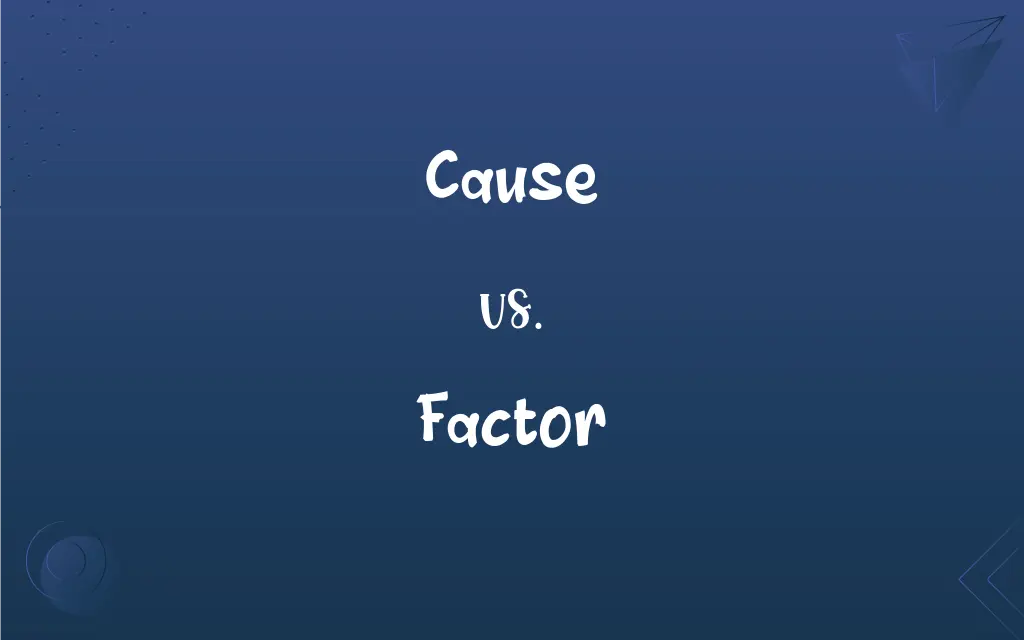Cause vs. Factor: What's the Difference?
Edited by Aimie Carlson || By Janet White || Published on December 15, 2023
Cause is a reason for an occurrence or result; Factor is an element contributing to a particular result or situation.

Key Differences
Cause refers to something that directly brings about an effect or a result. It implies a direct relationship where the presence of the cause leads to the effect. For example, a cause of a fire might be a lit match. Factor, on the other hand, is a broader term that encompasses any contributing element in a situation or event. A factor in a fire might be flammable materials, which don't directly start the fire but contribute to its spread or intensity.
Cause often denotes an action or event that directly results in another event. In medical terms, the cause of a disease might be a specific virus. Factor is used to describe a circumstance, condition, or aspect that affects a situation or outcome. For instance, stress can be a factor in many health problems, contributing to but not singularly causing them.
In legal contexts, cause is used to identify the reason for an action, like the cause for a lawsuit. It’s specific and direct. Factor in the same context might refer to various elements that contribute to the decision of a case, like evidence or testimony, which influence but do not singularly determine the outcome.
In scientific research, identifying a cause is about finding a direct link between variables, like proving that a certain chemical causes a reaction. Identifying a factor, however, is about recognizing elements that play a part in the broader context of a study, such as environmental conditions that might influence the outcome of an experiment.
Cause is more about a direct and singular influence, while factor is about contributing elements in a broader, more complex system. Both are important in understanding the dynamics of events and situations but represent different levels of influence and directness.
ADVERTISEMENT
Comparison Chart
Definition
Direct reason for an effect.
An element contributing to a result.
Relationship
Implies direct causation.
Implies a contributing role.
Usage
Specific and singular.
Broader and more varied.
Contexts
Often used in legal, scientific, medical fields.
Used in statistical, environmental, socio-economic contexts.
Example
Lightning strike causing a forest fire.
Dry weather as a factor in forest fire severity.
ADVERTISEMENT
Cause and Factor Definitions
Cause
Direct Reason.
Smoking is a major cause of lung cancer.
Factor
Influencing Aspect.
Economic stability is a key factor in market growth.
Cause
Reason for an Event.
Heavy rainfall was the cause of the flood.
Factor
Variable in a Situation.
Weather conditions are a crucial factor in crop production.
Cause
Origin of Action.
The cause of the accident was a flat tire.
Factor
Part of a Whole.
Exercise is a significant factor in maintaining good health.
Cause
Grounds for Belief.
The cause for alarm was the rising water levels.
Factor
Contributing Element.
Age is an important factor in learning abilities.
Cause
Basis for Action.
Their commitment to sustainability was the cause for implementing new policies.
Factor
Component of an Analysis.
Customer preference is a factor in product design.
Cause
Because.
Factor
One that actively contributes to an accomplishment, result, or process
"Surprise is the greatest factor in war" (Tom Clancy).
Cause
The producer of an effect, result, or consequence.
Factor
One who acts for someone else; an agent.
FAQs
How is factor defined?
An element contributing to a situation.
What defines a cause?
A direct reason or origin of an effect.
Can a factor become a cause?
Yes, if it directly leads to an effect.
What role do factors play?
Contributory, influencing outcomes.
Is cause always singular?
Often, but multiple causes can exist.
Are factors always multiple?
Usually, especially in complex situations.
Are factors controllable?
Some are, but not always.
Is identifying a cause crucial?
Yes, for understanding and prevention.
Can causes be predicted?
In some scenarios, with enough data.
Do causes vary in different fields?
Yes, depending on the context.
How does cause relate to effect?
It’s a direct and primary influence.
Can we control causes?
Sometimes, depending on the situation.
How do researchers identify causes?
Through experiments and analysis.
Why are factors important?
They provide context and depth of understanding.
What is a risk factor?
A factor increasing the likelihood of an outcome.
Are factors always negative?
No, they can be positive or neutral.
What is a causal relationship?
A relationship where one event causes another.
Why study factors in research?
To understand all influences on a result.
How do factors affect decision-making?
They provide broader insights for informed choices.
Can a cause be eliminated?
In some cases, to prevent an effect.
About Author
Written by
Janet WhiteJanet White has been an esteemed writer and blogger for Difference Wiki. Holding a Master's degree in Science and Medical Journalism from the prestigious Boston University, she has consistently demonstrated her expertise and passion for her field. When she's not immersed in her work, Janet relishes her time exercising, delving into a good book, and cherishing moments with friends and family.
Edited by
Aimie CarlsonAimie Carlson, holding a master's degree in English literature, is a fervent English language enthusiast. She lends her writing talents to Difference Wiki, a prominent website that specializes in comparisons, offering readers insightful analyses that both captivate and inform.






































































